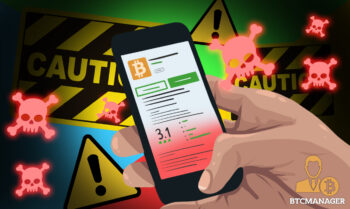2022-4-21 09:13 |
The foundational architecture underneath cryptocurrencies, blockchain has become a prominent force in present times, optimizing workflow while reducing operational costs. Contrary to general notions, its potential applications are not only limited to banking, cryptocurrencies, financial services, and supply chain systems. The properties of a blockchain network can also be utilized in several other contexts, notably cybersecurity. The question that arises next is- How will blockchain fare against cryptojacking?
Global Cybersecurity Trends and PatternsThe drastic increase in data generation and storage drives forward the global digital revolution. As an aftereffect, cybercriminals and hackers have also evolved into using new-age sophisticated techniques for stealing data or assets from users. Events of ransomware attacks and cryptojacking attempts are increasing rapidly, and the trends are estimated to increase with time. Security glitches in IoT devices could be exploited by miscreants in the near future, especially with the onset of 5G connectivity and high download speeds.
The 2022 Technology Spending Intentions Survey revealed that 69% of organizations are extending their cybersecurity budgets. The 2022 Kaspersky report also echoed similar findings, with 85% of respondents involved in IT decision-making acknowledging an increase in cybersecurity budgets by up to 2022.
Data breaches are among the main concerns associated with illicit cybercriminal activity, and phishing is involved in at least 36% of them. While mobile malware attacks have seen a decline, ransomware continues to wreak havoc worldwide. A single ransomware attack infected approximately 2323 schools, governments, and medical facilities as per The State of Ransomware Report. The fourth quarter of the previous year also witnessed a 175% rise in the number of ransom DDoS attacks with ransom DDoS attempts becoming increasingly prevalent.
Blockchain in CybersecurityThe digital age is increasingly becoming reliant on blockchain networks for their ability to offer real-time access to accurate data and validation. The networks consist of a collective of decentralized device systems, commonly known as nodes, which facilitate cross-border payment settlements.
Decentralization is one of the trademark features of blockchain technology. Combined with consensus mechanisms, blockchain is the ideal solution for assuring accurate data distribution within different layers of an organization, or within organizations. The transaction of data is irreversible within blockchain owing to its immutability. The technology can be used for data storage automation, as it enhances data integrity and transparency.
How Blockchain Can Help in Security IssuesOnline enterprises are right to worry and consider cybersecurity upgrades with 43% of hackers targeting small and medium-scale businesses. Insurance corporation Hiscox reports a single cybercriminal activity presents an expenditure of $200,000 for companies on average. Blockchain as a foundational technology presents promising solutions addressing multiple concerns, including retrieval as evident from its use by government enforcement agencies.
The FancyCat SagaCybercrime police units are increasingly opening up to the idea of using blockchain to trace illegal online activities or transactions. It has been very effective, and the latest success story comes with Fancycat’s exposure. The nefarious cybercriminal gang was responsible for extracting over US$500 million from ransomware attacks and/or other cybercriminal activities.
Anti-cybercrime law enforcement units from multiple countries including Korea, Spain, Switzerland, Ukraine, and the US partnered up with Interpol. The combined team swooped on a reported 21 Fancycat address locations in the city of Kyiv. 6 ring members were charged with the use of malicious ransomware software, in addition to other cybercriminal activities between 2019 and 2021. The attackers frequently targeted servers of US universities and Korean companies.
Improved Security in the Banking, Financial Services, and InsuranceThe BFSI sector has been the most prominent adaptor of blockchain technology, and for good reasons. In addition to swifter and more economical financial processing options, blockchain technology helps in real-time KYC updates, effectively reducing work redundancy, and ensures fair and non-fraudulent claim management services in the insurance sector. Blockchain reduces the time taken in manual claim settlement resolution by linking and streamlining the workflow consisting of processes like cross-checking and reconfirmation between bankers, clients, and insurers.
Boosting Security Features in Social MediaMetadata and personal details collected during social media interactions are protected by weak and unreliable passwords. Blockchain can be implemented into the existing architecture to develop a better standard security protocol than conventional end-to-end encryption. In addition, the technology can also facilitate secure private cross-messenger communication through a unifying API framework.
Blockchain Integration in IoTBlockchain can be integrated with IoT technology to prevent hackers from gaining access through edge devices. This is especially critical in the case of industrial IOTs(IIoT). Through decentralized administration, both systems and devices can be secured. In addition, blockchain decentralization applied for DNS(Domain Name System Entries) can prevent DDoS attacks. Storing large data amounts in a decentralized blockchain ledger shields the data from miscreants by eliminating single vulnerable points. The technology utilizes encryption to safeguard data from unauthorized access during transit.
Blockchain Digital IdentityBlockchain development companies like HashCash Consultants are collaborating with global cybersecurity firms and clusters to create a digital identity laboratory encouraging private-private partnerships for further optimization of organizational security and personal data protection. The technology had been previously used for digital identification in COVID vaccine administration, as well as supply chain management- one of the prime targets of cybercriminals.
Cryptojacking: How Much do we Need to Worry?Cryptojacking is described as the process of using others’ computers for mining cryptocurrencies without any authorization. Cryptojackers usually trick victims by injecting an untraceable crypto mining web script into their systems through emails/online ads or websites. They often mix and match for the desired performance. One of the main concerns for cryptojacking is its worming capabilities, making it harder to eliminate them from systems. However, there are steps to diagnose and prevent. Antivirus solution providers offer protection against crypto-mining.
The main cause of concern in cryptojacking is performance lagging. Cryptojackers utilize the system’s computational power for mining, and this leads to slower operations and overheating. Data breaches in cryptojacking incidents are uncommon despite their significant rise following the crackdown on ransomware. The delayed systems operations and subsequent overheating sets back organizations, particularly when multiple systems are being utilized for mining.
Final ThoughtsBlockchain adoption into existing infrastructure offers solutions and reduces security risks across multiple industrial sectors. The amalgamation of blockchain and cybersecurity sectors will be mutually beneficial, with the latter fortifying the decentralized environment even further.
origin »Bitcoin price in Telegram @btc_price_every_hour
High Performance Blockchain (HPB) на Currencies.ru
|
|



























